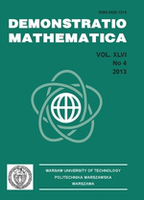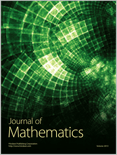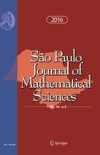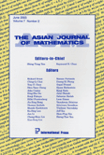
BOLETIN DE LA SOCIEDAD MATEMATICA MEXICANA
Scope & Guideline
Elevating Research in Miscellaneous Mathematics
Introduction
Aims and Scopes
- Pure Mathematics:
The journal publishes research focusing on pure mathematical theories, including algebra, geometry, number theory, and topology. These papers often explore abstract concepts and their implications in broader mathematical contexts. - Applied Mathematics:
Research that applies mathematical theories and models to solve practical problems in various fields, including physics, engineering, and biology, is a significant part of the journal's focus. - Mathematical Modeling:
The journal emphasizes the development and analysis of mathematical models that simulate real-world phenomena, such as epidemiological models, dynamical systems, and economic models. - Numerical Analysis and Computation:
Papers that discuss numerical methods, computational algorithms, and their applications in solving mathematical problems are frequently featured. - Interdisciplinary Research:
The journal encourages submissions that bridge mathematics with other disciplines such as computer science, physics, and biology, showcasing the versatility of mathematical applications. - Fractional Calculus and Differential Equations:
A notable area of focus includes fractional calculus and its applications in differential equations, reflecting the growing interest in non-integer order derivatives.
Trending and Emerging
- Fractional Differential Equations:
There is a notable increase in research on fractional differential equations, highlighting their importance in modeling complex systems and phenomena in various scientific fields. - Mathematical Biology:
The journal has seen a rise in publications related to mathematical biology, particularly in modeling diseases and ecological systems, demonstrating the relevance of mathematics in understanding biological processes. - Machine Learning and Data Science Applications:
Emerging themes include the application of mathematical principles to machine learning and data science, reflecting the increasing intersection of mathematics with technology and computational methods. - Topology and Algebraic Geometry:
Research in topology and algebraic geometry is gaining traction, with studies exploring new concepts and their applications in various mathematical frameworks. - Complex Analysis:
There is a growing interest in complex analysis, particularly in its applications to other areas of mathematics and physics, indicating an expanding scope of research.
Declining or Waning
- Classical Geometry:
Research in classical geometry has decreased, possibly due to the emergence of more computational and applied approaches that overshadow traditional geometric studies. - Basic Number Theory:
While still relevant, the frequency of papers focused solely on elementary number theory has waned as more complex and applied aspects of number theory gain prominence. - Combinatorial Designs:
Topics related to combinatorial designs and their applications have become less common, likely due to the increased focus on algebraic and computational methods in combinatorics. - Discrete Mathematics:
Although still a vital area, papers specifically addressing discrete mathematics without a clear application or connection to other fields are published less frequently.
Similar Journals

DOKLADY MATHEMATICS
Shaping the Future of Mathematics Through Rigorous ResearchDOKLADY MATHEMATICS is a prestigious journal published by MAIK NAUKA/INTERPERIODICA/SPRINGER, recognized for its significant contributions to the field of mathematics. Since its inception in 1996, the journal has been delivering high-quality research articles, fostering advancement in diverse areas of mathematical sciences. With an ISSN of 1064-5624 and an E-ISSN of 1531-8362, it has established itself within the academic community and holds a respectable Q2 quartile ranking in Mathematics (miscellaneous), indicating its relevance and influence. Although it does not operate under an open-access model, the journal remains an invaluable resource for researchers, professionals, and students, propelling innovation and scholarship in mathematics until 2024. The Scopus ranking situates it at rank #254 out of 399 in the Mathematics General category, showcasing its position within the broader landscape of mathematical journals. This journal is essential for those aiming to stay abreast of the latest findings and theoretical advancements in the mathematics domain.

AIMS Mathematics
Fostering collaboration in the pursuit of mathematical excellence.AIMS Mathematics, published by the American Institute of Mathematical Sciences (AIMS), is a premier open-access journal that has been providing a platform for innovative research since its inception in 2016. With a keen focus on diverse areas within the field of mathematics, this journal aims to disseminate high-quality studies that cater to both theoretical and applied aspects of mathematics. As evidenced by its impressive Scopus rank of 52 out of 399 in the category of General Mathematics, placing it in the 87th percentile, AIMS Mathematics stands as a significant contributor to the academic discourse in this discipline. The journal operates under Q2 in Mathematics (miscellaneous) for its 2023 category quartiles, reflecting its rigorous peer-reviewed process and substantial impact on current mathematical research. Accessible since its launch, the journal's open-access model ensures that researchers, professionals, and students alike can easily retrieve insights and advancements in mathematics, fostering collaboration and the advancement of knowledge globally.

Vietnam Journal of Mathematics
Exploring the Depths of Mathematical InnovationVietnam Journal of Mathematics, published by SPRINGER SINGAPORE PTE LTD, serves as a prominent platform for disseminating high-quality research in the field of mathematics. With an ISSN of 2305-221X and E-ISSN 2305-2228, this esteemed journal has established itself as a noteworthy contributor to the academic landscape since its inception in 2013, continuing its coverage until 2024. Enjoying a Q2 ranking in Mathematics (miscellaneous) for 2023, and holding a commendable Scopus rank of #126 out of 399 in General Mathematics, the journal stands at the intersection of innovation and scholarly excellence. Although still developing its open-access model, it provides a valuable resource for researchers, professionals, and students alike, who are keen to explore the vast universe of mathematical inquiry and application. As the journal progresses, it strives not only to publish original research but also to foster dialogue and collaboration within the global mathematics community.

Demonstratio Mathematica
Advancing Mathematical Knowledge for AllDemonstratio Mathematica, published by DE GRUYTER POLAND SP Z O O, is an esteemed open-access journal in the field of mathematics, with an ISSN of 0420-1213 and E-ISSN 2391-4661. Established in 1996 and providing open access since 2009, it has become a vital platform for disseminating innovative research and advancements in various areas of mathematics. With a commendable Scopus ranking of 85/399 in General Mathematics and a 2023 Category Quartile of Q2, it stands at the forefront of the mathematical community, demonstrating a significant impact within the top 78th percentile. The journal aims to foster a deeper understanding and appreciation of mathematical concepts and their applications, catering to both seasoned researchers and emerging scholars. Located in Warsaw, Poland, Demonstratio Mathematica not only enriches the academic discourse but also strengthens collaborative efforts within the international mathematics community, making it an essential resource for those seeking to expand their knowledge and research output.

Acta et Commentationes Universitatis Tartuensis de Mathematica
Cultivating a Legacy of Mathematical InquiryActa et Commentationes Universitatis Tartuensis de Mathematica is a prestigious academic journal dedicated to advancing the field of mathematics, published by UNIV TARTU PRESS. Located in Tartu, Estonia, this journal has been a prominent platform for scholarly discourse since its inception, covering a diverse range of topics in mathematics from theoretical to applied aspects. With an H-index reflecting its contributions to the literature, it holds a notable position in the Q3 quartile ranking for miscellaneous mathematics as of 2023. While it is not open access, the journal aims to disseminate high-quality research that contributes to the academic community and encourages collaboration among mathematicians. As it converges toward the tenth anniversary of its publication in 2024, the journal continually seeks to publish innovative work and foster the growth of knowledge within the mathematical sciences, making it an essential resource for researchers, professionals, and students alike.

Journal of Mathematics
Advancing mathematical frontiers through open access.Welcome to the Journal of Mathematics, a premier open access journal published by Hindawi Ltd, dedicated to advancing knowledge in the diverse realm of mathematics. Since its inception in 2013, the journal has provided a platform for the dissemination of significant mathematical research and applications, achieving recognition in the 80th percentile of the general mathematics category as per Scopus rankings. With a commitment to fostering academic collaboration and accessibility, the journal promotes critical dialogue among researchers, professionals, and students alike. Located in the vibrant academic hub of London, England, the Journal of Mathematics continues to enhance its impact within the mathematical community, as evidenced by its Q3 classification in mathematics (miscellaneous) for 2023. Join us in exploring groundbreaking research and innovations, as we converge towards the future of mathematical sciences through our open access model.

Sao Paulo Journal of Mathematical Sciences
Empowering researchers to share transformative mathematical insights.Welcome to the Sao Paulo Journal of Mathematical Sciences, a pivotal platform dedicated to advancing the field of mathematics, published by Springer International Publishing AG. Established in 2015 and running until 2024, this journal serves as a vital resource for researchers, professionals, and students interested in a plethora of mathematical topics, including computational theory, statistics, and general mathematics. While the journal holds a current Q4 quartile ranking in its categories, it provides an opportunity for contributors to disseminate innovative findings in an accessible manner. Although not an open-access publication, the journal is committed to ensuring that high-quality research is available to the academic community, fostering collaboration and growth within the discipline. Researchers seeking to publish in a dynamic and developing journal should consider the Sao Paulo Journal of Mathematical Sciences as an essential avenue for their work.

Results in Mathematics
Elevating Mathematical Discourse with High-Quality Research.Results in Mathematics, published by SPRINGER BASEL AG, is a prestigious academic journal dedicated to advancing the field of mathematics since its inception in 1978. Based in Switzerland, this journal has garnered a significant reputation, holding a Q2 ranking in both Applied Mathematics and miscellaneous Mathematics categories according to the latest 2023 metrics. The journal is a vital resource for researchers, professionals, and students, encouraging open dialogue about emerging mathematical concepts and methodologies. Our editorial objective is to publish high-quality research articles that contribute to theoretical advancements and practical applications in mathematics. Although it does not currently offer open access options, it provides in-depth studies and articles that fortify the knowledge base within the mathematical community. With a commitment to innovation and academic rigor, Results in Mathematics continues to serve as an essential platform for scholarly communication and exploration.

Frontiers of Mathematics
Exploring New Dimensions in Mathematical SciencesFrontiers of Mathematics, published by SPRINGER HEIDELBERG, is an emerging academic journal dedicated to fostering the advancement of mathematical sciences from 2023 to 2024. With an ISSN of 2731-8648 and E-ISSN of 2731-8656, this journal is positioned in the category of Q2 in the miscellaneous mathematics domain, showcasing its commitment to quality research and innovation. Although in its nascent stages, it has swiftly established a foothold within the global academic landscape, holding a Scopus rank of #198/399 and a median percentile of 50, indicating a promising trajectory. By providing an open-access option, Frontiers of Mathematics ensures broad dissemination of research findings, fostering collaboration and knowledge sharing across the mathematical community. Researchers, professionals, and students alike will find this journal to be an invaluable resource, contributing to important discussions and advancements in various mathematical fields.

Asian Journal of Mathematics
Innovating Through Mathematical ResearchAsian Journal of Mathematics, published by INT PRESS BOSTON, INC, is a premier scholarly journal dedicated to the expansive field of mathematics. With an ISSN of 1093-6106 and E-ISSN 1945-0036, it serves as a crucial platform for disseminating innovative research and methodologies in various mathematical domains. Established in 2005, the journal has garnered a significant reputation, currently holding Q2 rankings in both Applied Mathematics and Mathematics (miscellaneous) categories as of 2023. The journal aims to bridge theoretical research with practical application, making it an essential resource for researchers, professionals, and students seeking to advance their understanding and application of mathematical principles. Although it currently does not offer open access options, the journal's commitment to quality and rigor ensures its place as an influential reference within the mathematical community. Its office is located at PO BOX 43502, SOMERVILLE, MA 02143, United States, strategically positioning it as a key contributor to global mathematical discourse.